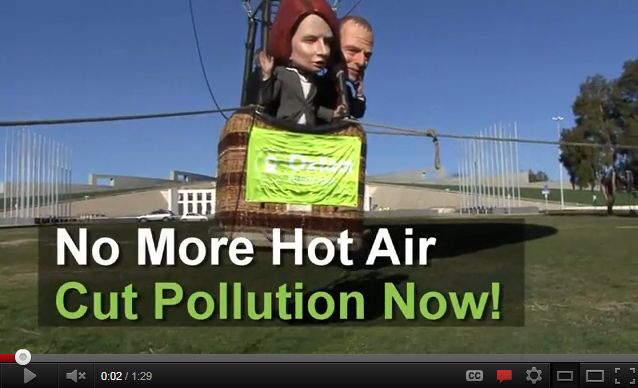Just four days before our sun blessed nation goes to the polls to vote, there I was in very chilly pre-dawn Canberra, driving around with Julia Gillard and Tony Abbott on my back seat.
Well, not Julia and Tony as you see on the nightly news, but large caricature heads of our political leaders. I must tell you, it sure is a bizarre sight to glance in your rear view mirror and find those two staring back at you!
As I drove these oversized heads through the quiet roundabouts of Canberra, I thought to myself: “If I did have the captive attention of those two in my back seat, what is it that I would say to them?”
But there was no time to ponder. It was time to dress Julia. Straighten Tony’s tie. Inflate the huge hot air balloon. Change balloon baskets. Attach banners. Curse myself for forgetting scissors. Welcome the photographers and camera crews. Remember the pearls for Julia. Discover scissors tucked away in a previously undiscovered pocket. Help our big heads climb into the balloon basket.
And then all of a sudden, they were up.
A stunning blue sky and Parliament house formed the perfect backdrop for our hot air balloon carrying the message, “No more hot air – cut pollution now!” While we’d all been having a lot of fun with the big heads, we were on the lawns of Parliament House with a serious message.
Australians don’t want more hot air, they want to hear about real solutions to tackle climate change in the last few days of this election campaign.
As the cameras whirred into overtime and photographers vied for the best angle I thought to myself, this is what I’d say to them:
“Julia and Tony, my name is Cara, I’m 26 years old, this is the third time I get to vote for a government to represent me in the country I call home. This election I want to vote for a leader who will act on climate change, not simply talk about it.”
If you found Julia and Tony on the back seat of your car, what would you say to them?
- Send your climate policy priorities to Gillard and Abbott now
- Check out more photos and a video
- Read the climate change election scorecard from our mates at the Australian Conservation Foundation



